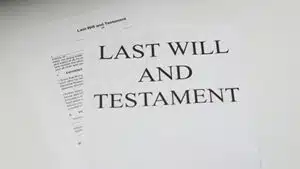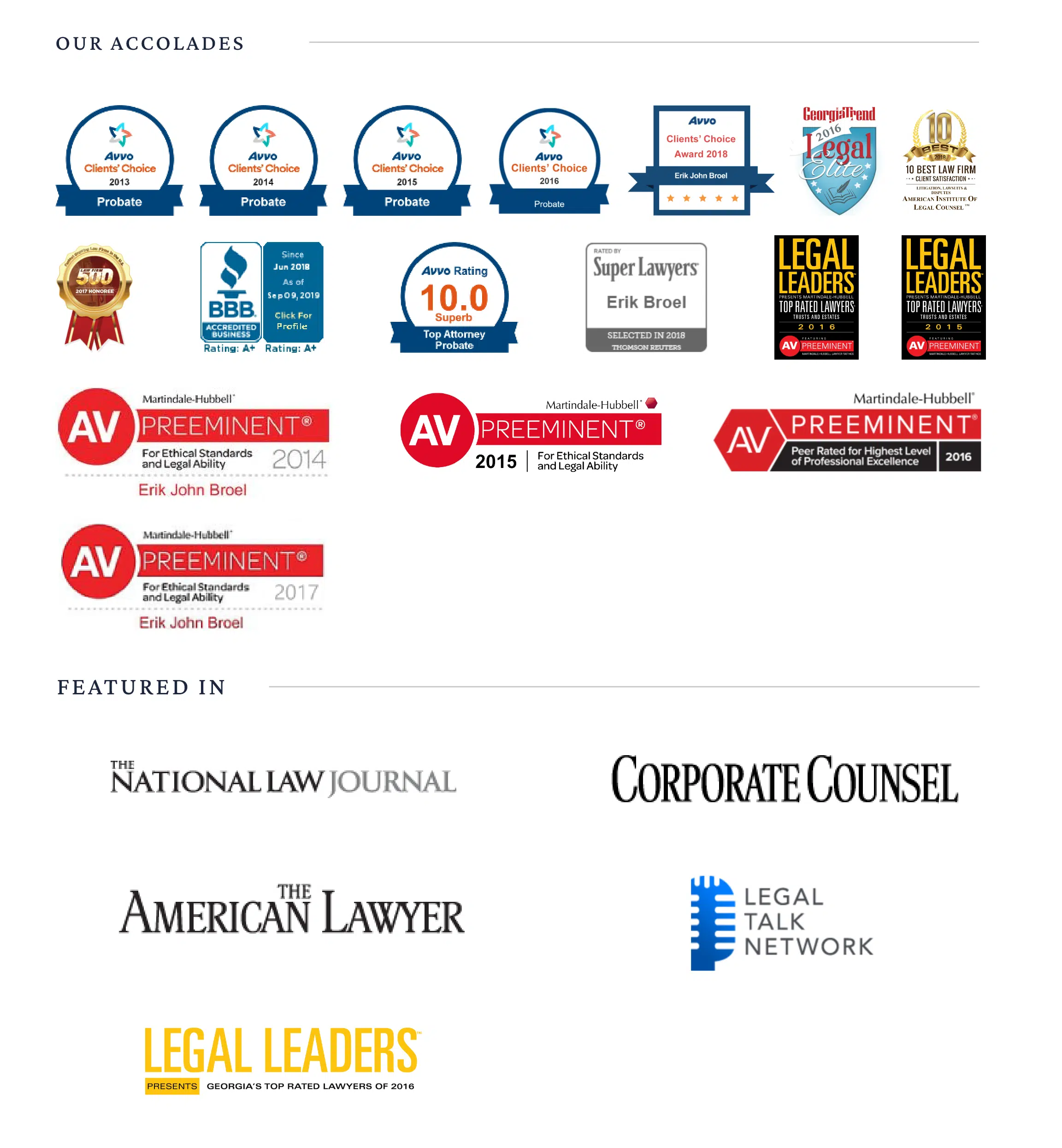In the complex probate process, an executor plays a vital and nuanced role. The personal representative appointed by the deceased person is responsible for paying the decedent’s debts and distributing inheritances to the beneficiaries as stated in the late person’s will, ensuring that the assets are distributed correctly and by state laws. But maybe you will ask yourself, “What power does an executor of a will have?” And what cannot he do? Can an executor decide who gets what?
In this article, we aim to provide a good understanding of the role of an executor of a will, the powers they may have, and the limits a personal representative has in distributing the decedent’s assets.
In Georgia, an executor (also known as a personal representative) is responsible for administering the deceased person’s estate. This responsibility carries both legal authority, power, and specific duties and obligations.
To demonstrate their legal authority to act on behalf of the estate, executors must typically obtain Letters of Testamentary, which are legal documents granted to them by the local probate court.
They give the executor the right to handle financial and other affairs related to closing out the estate, offering the power to act truly fiducially.
The default rule in Georgia is that the power of the Executor of a will is limited.
In this situation, they must ask the permission of the court to complete specific tasks related to the administration of the deceased inheritance, such as selling an estate property.
Limited executor powers may be:
Having expanded powers helps an executor simplify the estate in several different ways.
One of the most important ways is being able to avoid the costs and delays of filing additional petitions and having additional hearings with the probate court over issues like selling real estate property.
When the probate court has granted an executor or administrator expanded probate powers, settling the estate can happen more quickly, with less complexity, and at a much lower cost.
There are two primary ways to obtain expanded powers:
It is not uncommon for a will to list specific powers that an executor will have or to reference a code section from Georgia law that contains a long list of additional executor’s powers.
If no will was left, or the testament doesn’t provide any additional powers, then there is still a second way to secure expanded powers.
Unfortunately, if even one heir or beneficiary does not consent, the court cannot authorize the expanded powers.
When family members agree, each interested party can sign a consent form, which can be filed with the court along with a request for estate administration with expanded powers. The probate judge can grant or deny the request, but it is not uncommon for the powers to be given when everyone agrees.
Typically, the term Administrator would be used when the deceased did not leave a will, and it is used to call the person chosen by the Probate Court to act in the best interest of the estate.
If the named Executor(s) in a will cannot or will not fulfil the Executor’s duties and the Probate Court chooses someone not named in the testament to carry out the deceased’s wishes, then that person is considered an Administrator, although there is a will.
An Administrator and an Executor have the same role: properly managing the deceased’s estate and satisfying all interested parties.
The Executor of the estate must follow the terms legally required by the will.
If any heir believes that the Executor isn’t acting in their best interest or makes decisions outside the decedent’s terms, they may file a legal complaint.
A fiduciary is the highest type of relationship that the law understands. This means that a fiduciary must act primarily in the interest of the people whose inheritance (or money) they administer, not in his own self-interest.
It would be improper, for example, for an estate’s executor to do something or take some action that would advance their interest at the expense of the interests of one or more beneficiaries.
The Executor cannot partake in self-dealing in which they attempt to benefit themselves over the beneficiaries. They also cannot choose to act in the best interests of one beneficiary more than another.
The Executor cannot combine estate funds with their personal funds. An estate bank account must be established to hold any estate funds.
An Executor only has the authority the Probate Court has granted him. This means that, for example, when the Probate Court has not been granted the power to sell real estate or another deceased’s assets, the Executor cannot do this without the court’s permission.
The person who believes they are the Executor should find the original will and speak with an experienced probate lawyer to review and understand it properly.
They should then try to verify the will and start the appropriate application process with the Probate Court to be appointed executors.
The named Executor has no authority to act on the estate until the Probate Court appoints them and has received their Letters of Testamentary.

If you are the Executor, your core duty is to follow the wishes of the deceased person as stated in the will.
Here is a checklist of the various Executor’s responsibilities that come with the role:
Regardless of your personal opinion, the executor must be fair and distribute assets based on what heirs or beneficiaries legally own.
You will identify and protect all the estate assets, such as bank accounts, investment accounts, and other financial accounts, personal property, vehicles, or other possessions like jewelry.
You will also be legally responsible for opening an estate bank account to hold all the collected funds. We highly recommend keeping accurate records of the estate to address any potential disputes in the future.
Once appointed, you must identify all creditors and any debts the deceased owes. You will then run a creditor or debtor ad through the local newspaper to notify them that they may now come forward to file their claim.
Once the creditors submit their claims, you will pay the estate’s debts according to a creditor priority system in Georgia. As a rule, you must use estate assets to settle debts and taxes before distributing the remaining assets to heirs and beneficiaries.
While distributing assets, you must follow Georgia Law and honor the last will’s provisions. If the estate has run out of liquid assets and you still need to pay the estate debts and taxes, you may need to sell some of the deceased’s personal property to cover these financial obligations.
If the court asks you to obtain a bond, create inventories, or submit annual returns, the executor’s job is to promptly follow these requirements.
After you have distributed the assets to heirs and beneficiaries, you may now file for discharge from your role as Executor. Once the court accepts your discharge paperwork, you may receive a liability shield to protect you from any beneficiary, heir, or creditor attempting to file against you in the future.
If the Executor has taken money from the estate, it would be common for the court to order the Executor to be removed, compensation denied, and the money taken paid back.
Even if the Executor has been granted by the county probate court to act in this role, that doesn’t necessarily mean he has the final decision regarding the estate administration.
In fact, an Executor must always:
1. follow and honor the terms of the will. The deceased likely appointed the personal representative because they believed that the person would carry out the terms of the will with integrity.
2. follow the probate laws in Georgia. The personal representatives should familiarize themselves with the Georgia Probate Law and follow them as they carry out their duties.

The answer to this question depends on many factors, such as:
So, the answer to the question “Can the Executor Sell the House?” is that it depends.
First, the personal representative should review the deed to understand if the property was solely owned by the deceased or if there are other owners.
When one of the owners dies, the real estate titled as joint tenants with rights of survivorship automatically transfers ownership to the surviving ones, and the property will be excluded from the estate’s assets and probate proceedings.
When real estate is titled as tenants in common, the deceased’s share of the property will have to go through a probate process to be appropriately distributed to heirs and beneficiaries.
A probate attorney needs to review the will to fully understand the scope of the executor’s authority while fulfilling this role.
To sell a property of the deceased, the Executor must have certain expanded powers granted by the court. Otherwise, they will need a separate petition to get the court’s permission to sell the probate property. As an executor, it is essential to understand this.
Being appointed Executor of an estate does not mean you are always allowed to sell property. When you serve without expanded powers, you are very limited in what you can do without court approval.
If the estate’s creditors need to be satisfied and there are insufficient funds for paying debts, you may need to sell the property.
When
then the property must be given to the beneficiary when the bequest is distributed.
Due to divergent interests or a misunderstanding of the succession law, disputes may appear between the beneficiaries of an inheritance. But at the end of the day, everyone has only one goal – to resolve their disputes and move on with their lives.
There are several ways to solve these disputes:
Negotiations – you can start with informal negotiations that could lead to a settlement, usually between lawyers at different points in a dispute.
Mediation – is a formal process designed to encourage settlement before going to court and is required by the court in almost all cases. All parties meet, and a mediator is present to help resolve issues and determine if a settlement is possible.
Settlement – if all parties agree, a dispute can be settled immediately with a written agreement.
Hearing or trial – if all attempts to solve the dispute have failed, a hearing is the next legal action that may occur. Both parties must present evidence, an investigation will take place, and the successful court judge will decide on the outcome.
We always recommend getting assistance from an experienced probate attorney to understand the will and what an Executor can and cannot do.
Everything discussed in this article is for general information and is not legal advice.
If you are in a situation where you need help settling an estate correctly and want to understand better what power does an executor of a will have, we recommend you reach out to our office at (770) 637-6701 to set up a consultation.
Disclaimer: The information above is provided for general information only and should not be considered legal advice. Our probate attorneys provide legal advice to our clients after talking about the specific circumstances of the client’s situation. Our law firm cannot give you legal advice unless we understand your situation by talking with you. Please contact our law office to receive specific information about your situation.
Compassionate listeners, knowledgeable guidance. Schedule a free consultation with our experienced attorneys and let us help you and your family with your legal concerns.
GET IN TOUCH 770-796-4685Learn Important Probate Essentials, including key things that go wrong in an estate, how to prevent them, and what to do if they happen.



© 2024 Georgia Probate Law Group by Broel Law, LLC. All rights reserved.